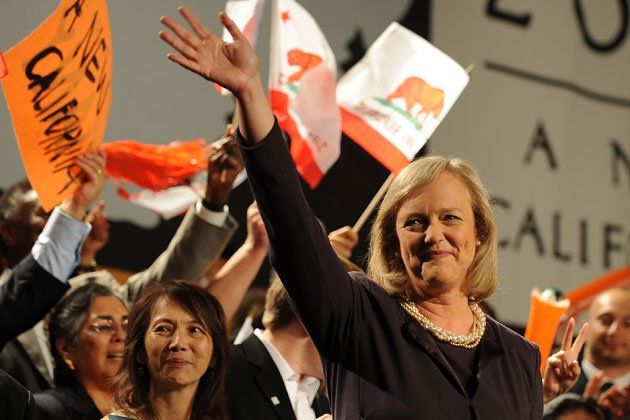
In California, Tuesday's primaries were kind to moderates. After all, gubernatorial candidate Meg Whitman—a pro-choice, centrist Republican—defeated her staunchly conservative rival, Steve Poizner, in the state's marquee contest. Actually, wait. Carly Fiorina adopted every archconservative stance she could conceive of—she supports outlawing abortion, repealing health-care reform, increasing offshore drilling, and allowing people on the no-fly list to purchase guns—and still managed to beat former representative Tom Campbell, an avowed centrist, by more than 30 percentage points.
So maybe moderate isn't right. Maybe what the good people of California voted for Tuesday night was CEOs—leaders who promised to revive the economy by applying their business expertise to government. On second thought, never mind. Poizner was a CEO, and he lost. As did former Facebook executive Chris Kelly, who failed to defeat San Francisco D.A. Kamala Harris in the race for attorney general.
If not CEOs, then, how about outsiders—you know, the challengers and anti-establishment types who are supposed to be the stars of the 2010 cycle? I mean, Whitman and Fiorina had barely voted in previous elections—so far, so good, right? I suppose so—that is, if you ignore the fact that Rep. Jane Harman fended off liberal challenger Marcy Winograd in the 36th Congressional District; San Francisco Mayor Gavin Newsom, the state's most famous progressive, won the Democratic nomination for lieutenant governor; and the current lieutenant governor, Abel Maldonado, clobbered Tea Partier Sam Aanestad for the Republican nod. Not to mention the fact that the ultimate outsider—birther Orly Taitz—lost her primary bid for secretary of state by a massive margin.
All told, California last night nominated a moderate Republican outsider for governor, a conservative Republican outsider for senator, an African-African former NFL wide receiver (Republican Damon Dunn) for secretary of state, an incumbent centrist Democrat for the House, and an incumbent Republican Latino and an ultraliberal San Francisco Democrat for lieutenant governor.
How do you explain that?
As mandated by the laws of punditry, the day after a big election—and Tuesday, with primaries in 11 states, was the biggest election since November 2008—is usually spent trying to reduce the previous evening's results into one easily digestible narrative. But yesterday may have been the day that those efforts, which so far this year have focused on forcing every election outcome into an "anti-insider" frame, were finally shown to be futile. Seriously, though: what single storyline can account for what happened in California—or, for that matter, what happened in the rest of the country?
As in the Golden State, heterogeneity reigned supreme. Down in Arkansas, embattled incumbent Sen. Blanche Lincoln surprised everyone by fending off her labor-fueled liberal challenger, Bill Halter, in the Democratic primary. And while the Tea Party helped former Reno assemblywoman Sharron Angle win the GOP Senate nod in Nevada, not one of the six Tea Party candidates in Virginia's Fifth Congressional District could come close to catching state Sen. Robert Hurt, the Republican Party's establishment pick. Ninety-eight current U.S. representatives and senators were on the ballot last night. Ninety-seven were renominated.
Is America in an anti-insider, anti-Washington mood? Absolutely—just check out the numbers. Any time unemployment hovers near 10 percent, voters are going to be pissed off at the people in charge.
But is that really news? And are we so desperate for corroboration that we have to seek it out in every election result—even when (as in the case of Sen. Bob Bennett's loss in Utah or Sen. Arlen Specter's defeat in Pennsylvania) it's not really there?
Frankly, I think it's more interesting to examine these contests not as plot points in a streamlined narrative but as discrete events that are happening in particular places, at particular times, to particular people. Sure, large, impersonal forces play a part. But the granular dynamics of actually getting elected—who has more money, who's the more compelling personality, who's staked out the smartest position on a hot-button local issue—will always be more important.
In California, these factors conspired to produce one of the most intriguing political lineups in years. Whitman has the potential to become a new kind of national GOP leader; Fiorina could unseat a star Democratic senator, Barbara Boxer; Newsom is always worth watching. The GOP roster—two women, an African-American, a Latino—is now far more diverse than the all-white Dems'. So here's hoping that Tuesday was a wake-up call of sorts, and that as the general-election season heats up, my journalistic colleagues and I stop reducing every contest to what we think we already know—and try to find out what's really going on instead.
Uncommon Knowledge
Newsweek is committed to challenging conventional wisdom and finding connections in the search for common ground.
Newsweek is committed to challenging conventional wisdom and finding connections in the search for common ground.





